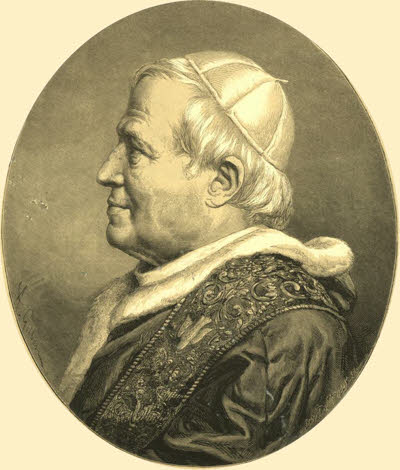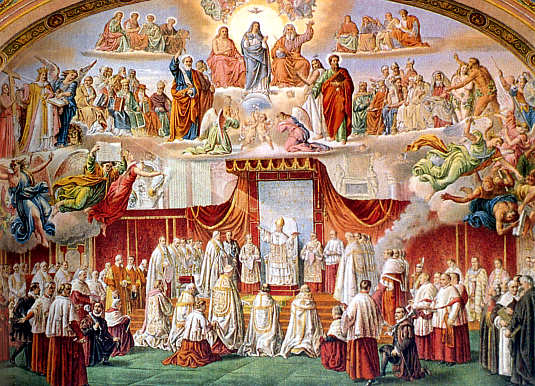|
Plinio Corrêa de Oliveira
The Immaculate Conception: The Celebration of Privilege
December 1958 (*) |
|
|
Wherefore, in humility and fasting, we unceasingly offered our private prayers as well as the public prayers of the Church to God the Father through his Son, that he would deign to direct and strengthen our mind by the power of the Holy Spirit. In like manner did we implore the help of the entire heavenly host as we ardently invoked the Paraclete. Accordingly, by the inspiration of the Holy Spirit, for the honor of the Holy and undivided Trinity, for the glory and adornment of the Virgin Mother of God, for the exaltation of the Catholic Faith, and for the furtherance of the Catholic religion, by the authority of Jesus Christ our Lord, of the Blessed Apostles Peter and Paul, and by our own: “We declare, we pronounce, and we define that the doctrine which holds that the most Blessed Virgin Mary, in the first instance of her conception, by a singular privilege and grace granted by Almighty God, in view of the merits of Jesus Christ, the Savior of the human race, was preserved free from all stain of original sin, is a doctrine revealed by God and therefore to be believed firmly and constantly by all the faithful.” Hence, if anyone shall dare — which God forbid! — to think otherwise than as has been defined by us, let him know and understand that he is condemned by his own judgment; that he has suffered shipwreck in the faith; that he has separated from the unity of the Church; and that, furthermore, by his own action he incurs the penalties established by law if he should are to express in words or writing or by any other outward means the errors he think in his heart. Our soul overflows with joy and our tongue with exultation. We give, and we shall continue to give, the humblest and deepest thanks to Jesus Christ, our Lord, because through his singular grace he has granted to us, unworthy though we be, to decree and offer this honor and glory and praise to his most holy Mother. All our hope do we repose in the most Blessed Virgin — in the all fair and immaculate one who has crushed the poisonous head of the most cruel serpent and brought salvation to the world: in her who is the glory of the prophets and apostles, the honor of the martyrs, the crown and joy of all the saints; in her who is the safest refuge and the most trustworthy helper of all who are in danger; in her who, with her only-begotten Son, is the most powerful Mediatrix and Conciliatrix in the whole world; in her who is the most excellent glory, ornament, and impregnable stronghold of the holy Church; in her who has destroyed all heresies and snatched the faithful people and nations from all kinds of direst calamities; in her do we hope who has delivered us from so many threatening dangers. We have, therefore, a very certain hope and complete confidence that the most Blessed Virgin will ensure by her most powerful patronage that all difficulties be removed and all errors dissipated, so that our Holy Mother the Catholic Church may flourish daily more and more throughout all the nations and countries, and may reign “from sea to sea and from the river to the ends of the earth,” and may enjoy genuine peace, tranquility and liberty. We are firm in our confidence that she will obtain pardon for the sinner, health for the sick, strength of heart for the weak, consolation for the afflicted, help for those in danger; that she will remove spiritual blindness from all who are in error, so that they may return to the path of truth and justice, and that here may be one flock and one shepherd. Let all the children of the Catholic Church, who are so very dear to us, hear these words of ours. With a still more ardent zeal for piety, religion and love, let them continue to venerate, invoke and pray to the most Blessed Virgin Mary, Mother of God, conceived without original sin. Let them fly with utter confidence to this most sweet Mother of mercy and grace in all dangers, difficulties, needs, doubts and fears. Under her guidance, under her patronage, under her kindness and protection, nothing is to be feared; nothing is hopeless. Because, while bearing toward us a truly motherly affection and having in her care the work of our salvation, she is solicitous about the whole human race. And since she has been appointed by God to be the Queen of heaven and earth, and is exalted above all the choirs of angels and saints, and even stands at the right hand of her only-begotten Son, Jesus Christ our Lord, she presents our petitions in a most efficacious manner. What she asks, she obtains. Her pleas can never be unheard. Given at St. Peter’s in Rome, the eighth day of December, 1854, in the eighth year of our pontificate. Pius IX
Painting of the Proclamation of the Dogma of the Immaculate Conception by Francesco Podesti in the Hall of the Immaculate within the Vatican Museums. In the Constitution Ineffabilis Deus [excerpt above] of 8 December, 1854, Pius IX pronounced and defined that the Blessed Virgin Mary “in the first instance of her conception, by a singular privilege and grace granted by God, in view of the merits of Jesus Christ, the Saviour of the human race, was preserved exempt from all stain of original sin.” Pope Pius IX’s definition of the dogma of the Immaculate Conception had varied but profound repercussions from all over the civilized world. The new dogma deeply shocked the essentially egalitarian mentality of the French Revolution, which since 1789 had despotically held sway in the West. The Blessed Virgin Mary “in the first instance of her conception, by a singular privilege and grace granted by God, in view of the merits of Jesus Christ, the Saviour of the human race, was preserved exempt from all stain of original sin.” To see a mere creature elevated so far above all others, enjoying an inestimable privilege from the very first instance of her conception is something that could not and cannot fail to hurt the children of a Revolution which proclaimed absolute equality among men as the basis of all order, justice and goodness. It was painful for both non-Catholics and Catholics more or less infected with this spirit to accept the fact that God established in creation and highlighted such outstanding inequality. Liberals dislike the nature of that privilege as such. Indeed, anyone who admits the existence of Original Sin, with all the spiritual disorders and miseries of the body that it entails, must accept that man needs an authority that he must obey. The definition of the Immaculate Conception was an implicit reaffirmation of Church teaching in this matter. For true Catholics, watching the intrepid and majestic figure of the Vicar of Christ standing alone against that tempest of unruly passions, threatening hatreds and furious despair, armed only with heavenly assistance, caused a jubilation like the one the Apostles felt during the storm on the Sea of Genesareth when the Savior commanded the winds and the sea to be calm: “venti et mare oboediunt ei” (Mt. 8:27). (*) Except of 1958 article by Plinio Corrêa de Oliveira entitled A First Milestone in the Rise of the Counter-Revolution. Nobility.org |
|



